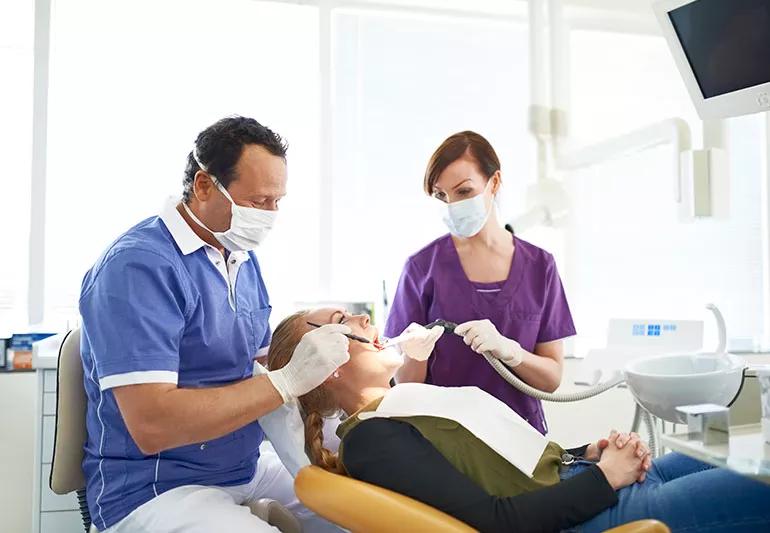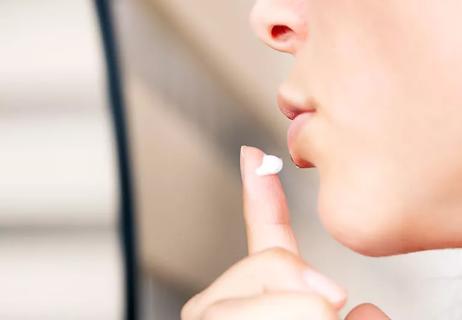The importance of seeing your dentist twice a year

Your dentist likes to see you every six months. During these visits, they routinely check your mouth and teeth for cavities and gum problems. But your dentist is also your first line of defense against something more serious: oral cancer.
Advertisement
Cleveland Clinic is a non-profit academic medical center. Advertising on our site helps support our mission. We do not endorse non-Cleveland Clinic products or services. Policy
Oral cancer includes cancers of the lips, tongue, cheek, floor of your mouth, hard and soft palate (the front and back of the roof of your mouth), and throat. Men are twice as likely as women to develop oral cancer, making it the sixth most common cancer among men.
This cancer can become life-threatening if it isn’t discovered and treated early. That’s why many dentists use these routine visits to check for signs of cancer.
“Evaluation of the oral cavity, including the soft tissues, is part of my exam when patients are in the office for a checkup,” says Todd Coy, DMD, Director of Cleveland Clinic’s Department of Dentistry.
An oral cancer screening is an important part of each dental checkup, says Dr. Coy. These screenings are comprehensive — and typically start before your physical exam even begins.
First, your dental hygienist will update your medical history with any changes that have occurred since your last visit. They’ll note if you’ve been diagnosed with any new conditions or diseases or are taking any new medications.
The medical history likely will also include questions about your risk factors for oral cancer, which include smoking and excessive alcohol consumption. People who smoke and drink alcohol have an even higher risk of oral cancer.
Advertisement
Your hygienist or dentist also will want to know about your current overall health, including any dental concerns.
During the cancer screening, your dentist will examine areas that are both inside and outside your mouth.
“A screening exam should include an extra-oral exam of the head and neck, as well as an intra-oral exam of the lips, cheeks, tongue, palate, floor of mouth and gum tissues,” Dr. Coy says.
The dentist is looking for any lumps, sores or irregular tissue changes, including discoloration. If they find anything suspicious, such as a lesion, your dentist may recommend a biopsy or refer you to an oral surgeon.
Oral cancer often appears as a growth or sore that doesn’t go away. For example, you might have persistent sores on your face, neck or mouth that bleed easily and don’t heal within two weeks.
Other common signs and symptoms of oral cancer include:
Having regular dental checkups will help you head off problems with your teeth. But because your dentist is also in a good position to catch signs of oral cancer, scheduling dentist appointments every six months is a good routine to follow.
“There are very few downsides to more frequent screening,” notes Dr. Coy.
A good rule of thumb is to see a dentist about lesions that don’t clear up within two weeks. Dr. Coy advises. “Examples would include red or white patches, ulcers, lumps or other growths.”
Difficulty chewing, swallowing or speaking as well as any pain, numbness or change in your bite should also prompt a visit with your dentist or a physician right away.
Don’t wait for a symptom to become painful, Dr. Coy says.
“It is important to understand that pain is not a predictable indicator. So don’t assume that because it doesn’t hurt that it isn’t a problem,” he says.
And when you see your dentist, don’t hesitate to share any questions or dental concerns you might have. No matter is too insignificant or unimportant to mention — and speaking up just might save your life.
Advertisement
Learn more about our editorial process.
Advertisement

Stay hydrated, use a humidifier and try sugar-free candies or over-the-counter products with xylitol

Non-cancerous ulcers usually heal within a few days or weeks — if it’s sticking around, it’s time to get it checked

This supposed oral health practice doesn’t have proven benefits, and it’s not a substitute for brushing and flossing

Surprising causes, symptoms and treatment

Dehydration, medication and nasal congestion are common culprits

Smoking, medications, acid reflux and even aging can all leave you with a bad taste in your mouth

The soreness could be from the way you sleep, teeth grinding, bite misalignment or other issues

Prescription oral antivirals are your best bet, but OTC creams can help, too

If you’re feeling short of breath, sleep can be tough — propping yourself up or sleeping on your side may help

If you fear the unknown or find yourself needing reassurance often, you may identify with this attachment style

If you’re looking to boost your gut health, it’s better to get fiber from whole foods